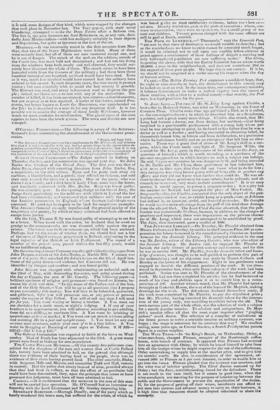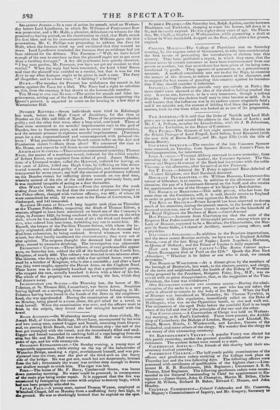Sr. Jolla LONG.—The case of Mr. St. John Long against
Chuhlus, a bookseller in Holywell Street, WM tried on Wednesday, in the Court of Common Pleas. Chubbs since time ago published a libel, as it is called, on the consumptive doctor ; in which . he described him as a Scotchman, a painter, and a great many more things. Chablis also stated, that Mr. Long had become a doctor, not from design, hut accident,—that being surprised in a questionable predicament with a young lady whose por- trait he was attempting to paint, he declared to her father that he was a doctor as well as a dauber ; and having succeeded in obtaining belief, he thenceforth betook him, at leisure and front deliberation, to a profession which he had chosen hastily and on an emergency that left him 110 alter- native. There was a great deal of abase of Mr. Long's skill as a sur- geon, which the Court made very light of. Mr. Sergeant Wilde, the counsel for Mr. Long, gave, in the course of his address to the Jury, an anecdote of himself; which is worth recording, as a specimen of the pleasant exaggerations in which lawyers on such a subject can indulge.. He said, " upon one occasion he was dangerously ill, and being attended by Dr. Bantle and .31r. Clyne, those gentlemen at last informed him, with teiws in their eyes, that they dill net know what to do for him ; they had given him every known poison with.,al being able to produce any Teel ; and they did not know what fernier they could do. Ile was ad- vised to change these gentlemen for some others, lett he refused; and timately he recovered, very much to their astonishment." It is no easy matter, it would appear, to poison a sergeant-at-law ; it is a pity but the member for Newark had occupied the place of Miss Castile. Mr. Sergeant Spa nkie, for Chulths, contended that the only object of the pub- lication complained of was, to exhibit Long as a quack,—or, as Johnson had defined it, an ignorant, artful, and boastful pretender. He thought he would receive more advantage from the puff of the trial than damage from the alleged libel. The Lord Chief Justice observed, that the pub- lication was undoubtedly lihellous, because, in addition to the charges of quackery and imposture, there were imputations nu the private charac- ter oh' Mr. Long, which were not attempted to be established by proof. The Jury, thus instructed, gave a verdict of 100/. THE JUVENILE LIRRARY.-011 Tuesday, Mr. PlaitChe obtained from Messrs. Col bunt and Bentley, by verdict in the Common Pleas, 50/. as COM- pensation for labour bestowed in the compilation of a Freatise on Ancient Armour for the Juvenile Library. The principal evidence in the case was Mr. Jerdan, editor of the Literary Gazette, who was also editor of the Juvenile Ltbrary. Mr. Jerdan said, he engaged Mr. Planche to furnish the early history of ancient armour and costume, and for this he was to receive IOW. Mr. Plantheefronz his dramatic talent and know- ledge if armour, was thought to be well qualified to perform this part of the undertaking ; and no objection WaS made by Messrs. Colburn and Bentley to the terms of his engagement. Eight or ten gentlemen were engaged to furnish the different portions of the work. It was aban- doned in September last, when only three volumes of the work had been published. Notice was sent to Mr. Planche of the abandonment of the work. He had not then completed his article ; but he had bestowed so much of his time and abilities upon it as to entitle him to a remu- Iteration of 50/. Another witness stated, that Mr. Planche had spent a fortnight at Gederich House, the seat attic learned Dr. Meyrick, making drawings for the work. The defendants declared themselves ready, if
the work were completed by Mr. Planche, to pay the stipulated price ; butt Mr. Manche, having exercised his dramatic talent for the instruc- tion of the young only, was unwilling to exhibit before the old. The most curious part of the whole affair, was the selection of such a subject for a merely popular treatise. To scholars and antiquarians, Dr. 3Iey- rick's treatise offers all that the most eager inquirer after "jingling jackets" could desire. The selection of a compiler of metodrame as the fittest person to write a scientific treatise on military costume, was happy ; the stage is notorious for its accuracy that way ! We recollect seeing, some years ago, at Covent Garden, a Scotch Presbyterian parson figure in a tartan surplice.
TILE WINE TRADE.—In the King's Bench, on Wednesday, Oxley, a wine-merchant, charged Pitman, occupier of the Hambrough coffee-
house, with breach of contract. It appeared that Pitman had entered into an agreement. with Oxley, by which he hotted himself to take from him all the foreign wines he might require for the use of the coffeehouse, Oxley undertaking to supply him at the market price, and to give him six months' credit. He also, in consideration of this agreement, ad- vanced 500/. to Pitman at 5 per cent. interest, in order to enable him to get into the house. Pitman pleaded that the contract was usurious, and
the wine was of inferior quality. The Chief Justice summed up for Oxley; but the Jury, notwithstanding, found for the defendant. There is not much in the case itself, but it comes in good time, when the wine-merchants are meeting for the purpose of interfering between the public and the Government to prevent the equalization of the duties. If, for the purpose of getting off their wines, merchants can afford to put men into taverns and advance money to carry on their business, it is high time that measures should be adopted calculated to abate the monopoly. IMPATIENT Jueons.—In a case of action for assault, tried on Wednes- day before Lord Lyndhurst, in which Mr. Williams of Paternoster Row was prosecutor, and a Mr. Halls, a plumber, defendant—a witness for the prosecution having proved, on his examination in chief, that Halls struck the _first blow, and on his cross-examination that Williams gave the first provocation, Mr. C. Phillips was proceeding to address the Jury for Balls, when the foreman stood up and exclaimed that they wanted no more. Lord Lyndhurst reminded the foreman that no evidence had yet been adduced for the defence. The Foreman—" Well, we have heard trzwaigh of the case to convince us that the plaintiff ought not to get more than a farthing damages." A dry old gentleman here quietly observed, "I beg your pardon, Mr. Foreman, you have not got my consent to that verdict." When the reply had been concluded, the Lord Chief Baron :raid that the plaintiff was entitled to a verdict, but that is was for the, Jury to say what damages ought to be given in such a case. The Jury all altogether, and in a loud voice, "A farthing ! a farthing !''
HT.—The member for Preston has withdrawn the record in his attion against the Times for a libel. The Times had a right to calculate this, from the courtesy it has shown to the honourable member.
Tree MARQUIS AND THE NI:um—The action for assault and false im- prisonment, arising out of the fracas at Holderness House respecting the Queen's present, is expected to come on for hearing in a few days at it'estnainster Hall.



























 Previous page
Previous page